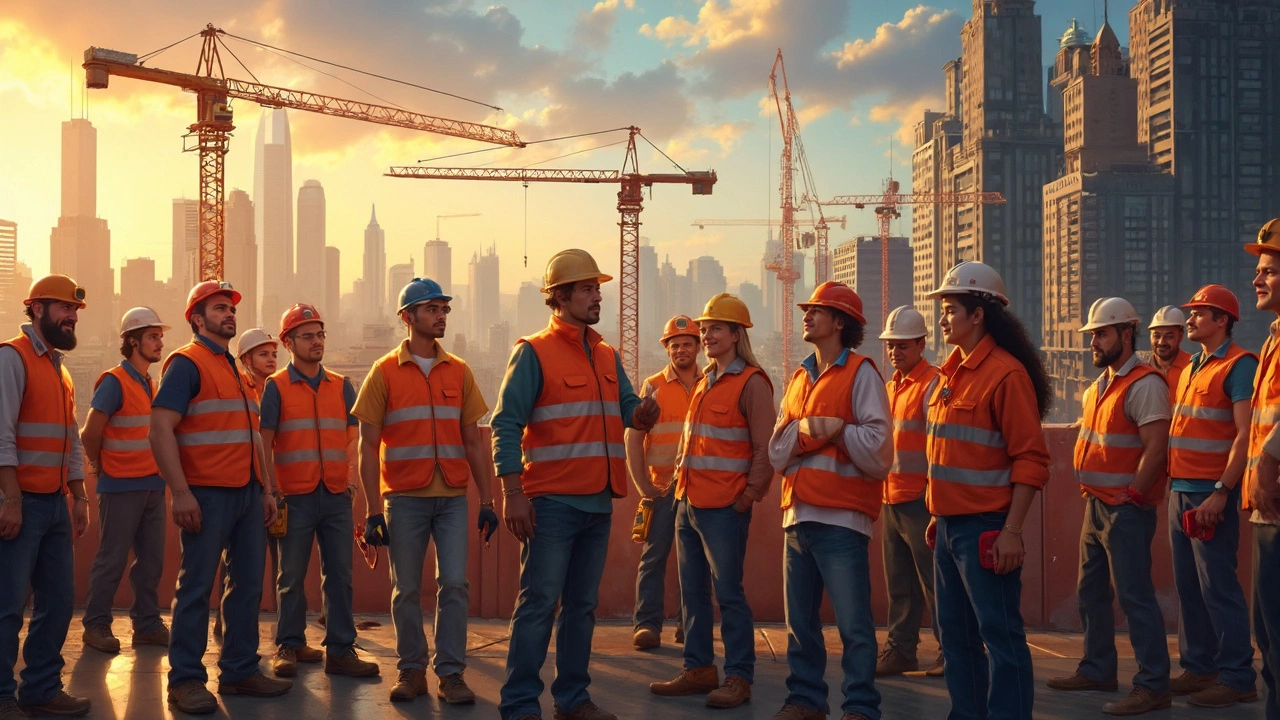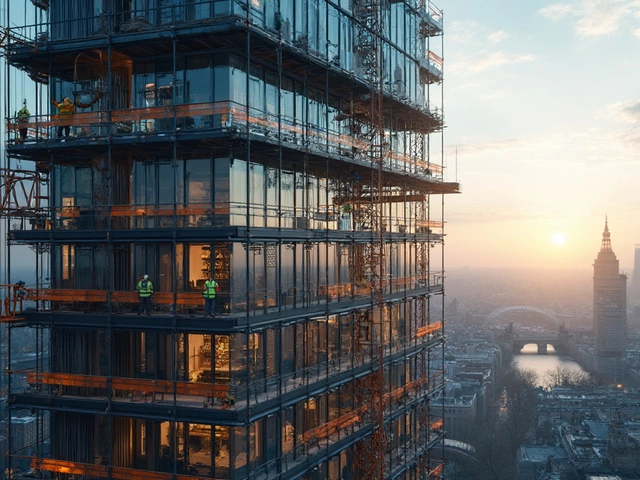Ever sized up a skyscraper or a sleek apartment building and wondered who cashes in the most from building it? It’s not always who you think. In construction, some trades pull in way more than others, and it’s not just about the muscle—there’s real strategy behind picking the right one.
If you're chasing a paycheck, not all construction jobs are equal. Skilled trades like elevator installers, pile driver operators, or electrical power-line workers are often at the top when it comes to paychecks. You don’t need a four-year degree, but you do need serious skills, certifications, and sometimes nerves of steel.
Let’s cut to the chase: choosing the right trade can mean the difference between just getting by and making real money. This isn’t about guessing; it’s about knowing why certain jobs pay more and what you can do—right now—to get ahead. Whether you’re starting from scratch or thinking about a switch, there’s cash on the table if you play your cards right.
- Why Construction Trades Pay Differently
- Top Earning Construction Trades in 2025
- What Drives High Pay in a Trade
- Education vs. Experience: What Matters More?
- Tips to Maximize Your Earnings
- Looking Ahead: The Future of High-Paying Construction Trades
Why Construction Trades Pay Differently
This is where things get interesting. Not all construction gigs are created equal when it comes to pay. You’ll see someone swinging a hammer making less than a guy running wires behind walls. So what’s going on?
It boils down to skill, risk, demand, and, honestly, how tough it is to find people to do the work. Some trades need more training, special certifications, or carry more risk—think about climbing 100 feet up to fix power lines versus painting someone's living room. It’s no surprise that the bigger the risk and skill level, the fatter the paycheck gets.
Let's look at some known pay drivers in the highest paid construction jobs:
- Experience & Certifications: Trades needing long apprenticeships or special licenses (like electricians or crane operators) pay more because not everyone can walk in and start.
- Physical Danger: Jobs like ironworkers or elevator repair folks earn more because their work can be straight up dangerous.
- Supply and Demand: If there’s a real shortage, like with welders or lineworkers, those wages get bumped up fast.
- Project Complexity: Working on big commercial jobs pays more than doing home repairs because it takes more skill and responsibility.
Check out this quick comparison in average annual wages (2024, US Bureau of Labor Statistics):
| Trade | Average Annual Wage |
|---|---|
| Elevator Installers & Repairers | $104,650 |
| Electricians | $65,280 |
| Carpenters | $55,190 |
| Roofers | $51,910 |
| Construction Laborers | $44,090 |
So if you’re thinking about getting into a trade or shifting gears, factor in how hard the job is to break into, how much risk you’re willing to take, and how badly people need your skills. These all play a big part in what ends up in your bank account.
Top Earning Construction Trades in 2025
If you're curious about where the big money really lands in construction, you won’t be shocked to learn that some trades have paychecks that blow others out of the water. It’s less about swinging hammers and more about who’s got the know-how—or the certifications—for the risky or specialized stuff. Here’s a quick look at the highest paid construction jobs in 2025, according to recent data from sources like the Bureau of Labor Statistics and top industry surveys.
| Trade | Average Annual Salary (2025) | What Makes It Lucrative? |
|---|---|---|
| Elevator Installers & Repairers | $97,000 | Highly specialized work, safety risks, union strength |
| Electrical Power-Line Installers | $91,500 | Technical skills, risk, demand for power infrastructure |
| Crane Operators | $87,300 | Certification required, skill-based, high responsibility |
| Pile Driver Operators | $85,800 | Heavy machinery expertise, fewer qualified workers |
| Construction Managers | $104,200 | Leadership role, responsibility for budgets & projects |
| Boilermakers | $77,400 | Physical demands, travel required, technical skills |
Notice something? The highest paid gigs aren’t always the most talked about. Everyone knows about electricians and plumbers, but elevator mechanics and power-line techs are quietly raking in top dollar. If you chase after the highest paid construction jobs, you’ll want to keep an eye on trades needing intense, hands-on training or those where safety is a big concern—those gigs almost always pay more.
- If you like heights, power-line work or crane operation is tough but the pay proves people value those nerves.
- Construction management doesn’t always mean years at a university—lots start as workers and climb up.
- Don’t ignore the trades with less competition; the fewer folks you compete with, the better your chances of nabbing top pay.
Looking at these numbers, it’s clear you don’t need a college diploma to hit a six-figure salary in construction. But you do need to be smart about which doors you knock on and be willing to build up the right certifications and experience.
What Drives High Pay in a Trade
So, what actually makes one construction job pay way better than another? It usually boils down to a mix of skill level, risk, demand, and certifications. The more specialized and scarce the skill, and the higher the risk, the bigger the paycheck.
First up, highest paid construction jobs demand real skill and responsibility. Elevator installers and repairers, for example, have to be precise—one bad move, and there’s serious danger. That’s why these trades not only pay well but also insist on tough training and certification programs that take years. Not everyone can stick with it, so fewer people are qualified, and companies are hungry for those who are.
Risk level also factors in. Jobs like working as a tower crane operator or a power-line installer aren't for the faint-hearted. You’re up high, dealing with heavy machinery or live wires, so employers pay extra to attract people willing to face the danger and handle the pressure.
Certain trades are always in high demand. Think electricians and plumbers—modern life falls apart without them, and not enough young people are picking up the tools. That shortage keeps wages climbing.
Location makes a big difference too. In big cities or fast-growing regions, skilled trades can charge way more for their work, especially if there’s a building boom or lots of infrastructure projects in play.
- Specialization: The rarer the skill, usually the higher the pay.
- Risk: More danger means higher rates.
- Demand: Less competition, more opportunities to make money.
- Certifications: Licenses and special training drive up your value.
- Location: Big city or high-demand regions often mean bigger paychecks.
Want better pay? Look for a trade that combines a bit of risk, a pinch of rarity, and steady demand. Stack on extra training, rack up experience, and you’ll find yourself in the sweet spot for earning power.

Education vs. Experience: What Matters More?
This is a hot debate on every jobsite. Does a certificate matter more than years swinging a hammer? In most top-paid construction roles, experience wins out, but you can’t skip education either. Skilled trades are all about what you can actually do, not just what you know on paper.
Let’s talk real numbers: According to the Bureau of Labor Statistics, elevator installers made a median of $99,000 in 2024. Most start as apprentices, doing hands-on work for about four years. That’s 8,000 hours on the job and around 600 hours in the classroom. You need both, but you’ll learn fast that bosses pick the guy who gets stuff done over the guy with the most certificates.
Check out this quick comparison of real job requirements and pay ranges in construction:
| Trade | Required Education | Required Experience | Median Annual Pay (2024 USD) |
|---|---|---|---|
| Elevator Installer | Apprenticeship | 4-5 years | $99,000 |
| Electrician | Apprenticeship | 4-5 years | $63,000 |
| Pile Driver Operator | High school diploma + Apprenticeship | 2-3 years | $77,000 |
| Boilermaker | Apprenticeship | 4-5 years | $70,000 |
Hands-on training is where you really stack up skills and stack up pay. A lot of highest paid construction jobs require passing tests for licenses, but you can't even sit for those tests without racking up enough hours in the field. The guys making the most aren’t just book smart—they’re problem solvers with scars, stories, and a whole lot of jobsite know-how.
- Get in early as an apprentice—this is where the learning begins.
- Don't ignore the classroom—the safety and technical stuff really matters.
- The more experience you rack up, especially on tough jobs, the more the pay jumps.
- Stack extra skills, like welding or rigging, to bump your rate even higher.
Bottom line? Nobody’s handing out high-paying trades jobs to folks who only show up for tests. The combo of real-world experience and smart training opens the door to fatter paychecks.
Tips to Maximize Your Earnings
If you want to move up the pay ladder in construction, you can’t just show up and do the bare minimum. You gotta think smart, build your rep, and pick the right spots to level up—sometimes literally. Here's how people in highest paid construction jobs make sure their bank accounts stay stacked.
The most valuable guys on site are usually the ones who hold extra certifications. Stuff like OSHA 30, welding certs, or specialty equipment licenses can mean an immediate bump in pay—sometimes $2 to $5 extra per hour, depending on the job and region. Union members also often earn more, especially if you can land an apprenticeship with a solid program in your area.
Don’t skip networking. The best jobs often don’t even get posted—they’re handed over to workers who already proved themselves. Stay connected, show up on time, have a strong work ethic, and you’ll often get the call first when high-paying gigs come up.
Picking the projects you work on also matters. Work on commercial sites or government contracts, and you could earn more than jobs for small-time residential builds. Here’s a quick look at how pay rates can shift based on certification, experience, and union status:
| Job Title | No Certs (Avg. Pay) | Certified (Avg. Pay) | Union (Avg. Pay) |
|---|---|---|---|
| Electrician | $25/hr | $32/hr | $38/hr |
| Elevator Installer | $31/hr | $40/hr | $44/hr |
| Plumber | $24/hr | $30/hr | $36/hr |
Want to make more? Here’s what people in the know recommend:
- Keep learning: Take classes or short courses—advanced electrical, rigging, or new tech (like smart home systems) are hot right now.
- Say yes to tough jobs: Night work, heights, or remote areas usually pay premiums. If you’re willing, you’ll cash in.
- Consider leadership: Becoming a crew leader, foreman, or site supervisor can mean a big jump in your paycheck. It’s not just about swinging a hammer, it’s about running the show.
- Track your hours and overtime: Don’t leave money on the table. OT in construction sometimes pays double and adds up fast.
Treat your tools, gear, and truck as investments. Reliable guys with the right setup get trusted with better, better-paying work. And finally, check pay rates in neighboring cities or states; sometimes a short commute is all it takes to bump your income.
Looking Ahead: The Future of High-Paying Construction Trades
The world of construction is changing fast, and some trades are set to become even more valuable in the next few years. Right now, the push for green energy and advanced technology isn’t letting up. This pushes certain jobs, like electricians who know how to set up solar and wind systems or HVAC techs who work with smart, energy-efficient units, even higher up on the pay scale.
Data from the US Bureau of Labor Statistics shows that jobs related to renewable energy, like solar panel installers and wind turbine techs, are growing at double-digit rates. While some old-school trades are still in demand, the real boost goes to those who adapt to tech. If you can program a smart home system or safely wire up a battery bank, you’re ahead of the curve—clients will pay for it.
Tech skills aren’t the only thing making a difference. The shortage of experienced workers, as older pros retire, is making skilled trades even more valuable. If you’re reliable and show up with the right certifications, bosses are willing to pay a premium.
- Get comfortable with digital tools—blueprints and project updates are going mobile.
- Specialize in areas like energy efficiency, automation, or custom installations, where the demand is only going up.
- Don’t ignore safety and leadership training. Supervisors and safety leads in construction now average 20% more pay than their jobsite coworkers.
Some of the best paying jobs in the next decade will be in fields that blend hands-on work with tech know-how. So if you’re choosing a path now, look for a trade that puts you at the center of where construction is headed, not where it’s been. The highest paid construction trades are evolving—and so should you.





